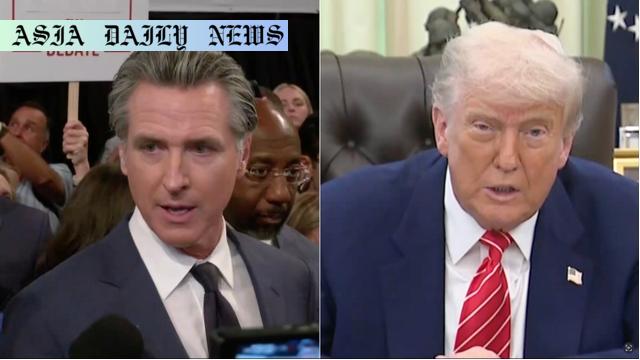California accuses Trump administration of illegally federalizing National Guard troops, sparking legal action and opposition.
California challenges Trump administration’s federalization of the National Guard.
Governor Newsom emphasizes the defense of state authority and democracy.
California seeks a legal ruling declaring Trump’s order unlawful.

California Challenges Federalization of National Guard
The state of California has taken a definitive stand against the Trump administration by filing a lawsuit challenging the federalization of its National Guard troops. This legal battle arises from President Trump’s decision to deploy National Guard forces to Los Angeles in response to protests against the administration’s crackdown on immigration policies. California officials allege that the President’s actions not only bypassed Governor Gavin Newsom’s approval but also directly conflicted with the state’s specific preferences for handling local crises.
These developments reflect a broader trend of escalating tensions between state governments and federal authorities over the balance of power. California has alleged that the federal deployment represents an “inflammatory escalation,” accusing the administration of exceeding its legal boundaries. According to the state, federalizing the National Guard strips California of a critical resource for managing emergencies like natural disasters or public safety crises. This unilateral federal action has ignited widespread concern about its implications for state sovereignty and the principle of democracy.
Concerns Over Authoritarianism and Federal Overreach
Governor Gavin Newsom has been an outspoken critic of the federal government’s approach, describing the deployment as a “dangerous overreach” that encroaches on state authority. In a statement, Newsom called on governors across party lines to rally against such actions, which he believes endanger the fabric of democracy. California Attorney General Rob Bonta echoes Newsom’s sentiments, condemning the decision as rooted in political motivations rather than genuine legal necessity.
Bonta further argued that there is no evidence of an “invasion or rebellion” in the region that would justify federal intervention under the guise of national security. Instead, he accused the administration of manufacturing a crisis for personal political advantage, which he believes undermines trust between national and state institutions. These allegations raise important questions about whether federal actions prioritize political gain over constitutional boundaries and public well-being.
Implications for State Sovereignty and Democratic Principles
The federalization of National Guard troops has deeper ramifications beyond the immediate dispute. It sets a precedent that could diminish state autonomy in critical moments. States rely on the National Guard to manage local emergencies, including fires, floods, and other natural disasters. By federalizing these resources without coordination, the administration risks leaving states unprepared for emergencies that necessitate swift and localized responses.
More broadly, this confrontation highlights ongoing tensions regarding the interpretation of constitutional responsibilities. While national security is a shared objective, unilateral action without state consent erodes the trust and collaboration necessary to address complex challenges effectively. California’s lawsuit seeks to affirm not only its rights but also the broader principles of federalism that protect state authority within the American legal system.
Legal Battle and Broader Political Ramifications
California’s legal challenge against the Trump administration is likely to spark nationwide debate about the limits of federal authority. If the courts ultimately side with California, it could set a significant legal precedent that limits a President’s power to unilaterally federalize state resources under controversial circumstances. Conversely, a ruling in favor of the federal government could empower future administrations to exert similar control over state-run institutions without local consent.
Beyond the legal ramifications, this dispute adds another layer to the complex politics surrounding immigration, public protests, and executive authority during the Trump presidency. It underscores the broader ideological clash between states that prioritize progressive approaches versus a federal government pushing more conservative policies. For California, this lawsuit is not just about reclaiming control over the National Guard but also about asserting its vision of democracy and governance in the face of perceived authoritarian overreach.



Commentary
California’s Bold Legal Move: A Stand for States’ Rights?
California’s decision to file a lawsuit against the Trump administration is a significant, if not bold, statement about the limits of federal authority in the United States. At its core, this legal battle underscores the importance of separating state and federal responsibilities—a foundational principle of American democracy. Governor Gavin Newsom has effectively framed this dispute as one that transcends partisan politics, arguing that all governors should agree on safeguarding their states’ autonomy.
From a legal perspective, the case raises intricate questions about the permissible extent of federal intervention in state affairs. The Trump administration’s action, labeled by California as an “inflammatory escalation,” challenges the conventional understanding of when federal authority can override state governance. If left unchallenged, it could open the door for future administrations to federalize resources without proper justification. In this sense, California’s lawsuit serves as a preemptive check against potential abuses of power, ensuring that no President—regardless of political alignment—can undermine local governance arbitrarily.
Implications for National Discourse
Beyond its legal ramifications, California’s lawsuit is also deeply symbolic. It reflects the broader ideological divide between the Trump administration’s approach to governance and the progressive values championed by states like California. Many view this as a microcosm of larger national debates over immigration, state rights, and the appropriate role of government in addressing civic unrest.
Whatever the outcome, one thing remains clear: this lawsuit will have long-lasting implications for how the United States navigates the delicate balance between state and federal power. It forces Americans to reflect on what kind of country they want to cultivate—a place where local autonomy is respected or one where centralized authority takes precedence. The stakes are undeniably high, making this legal battle one to watch closely.